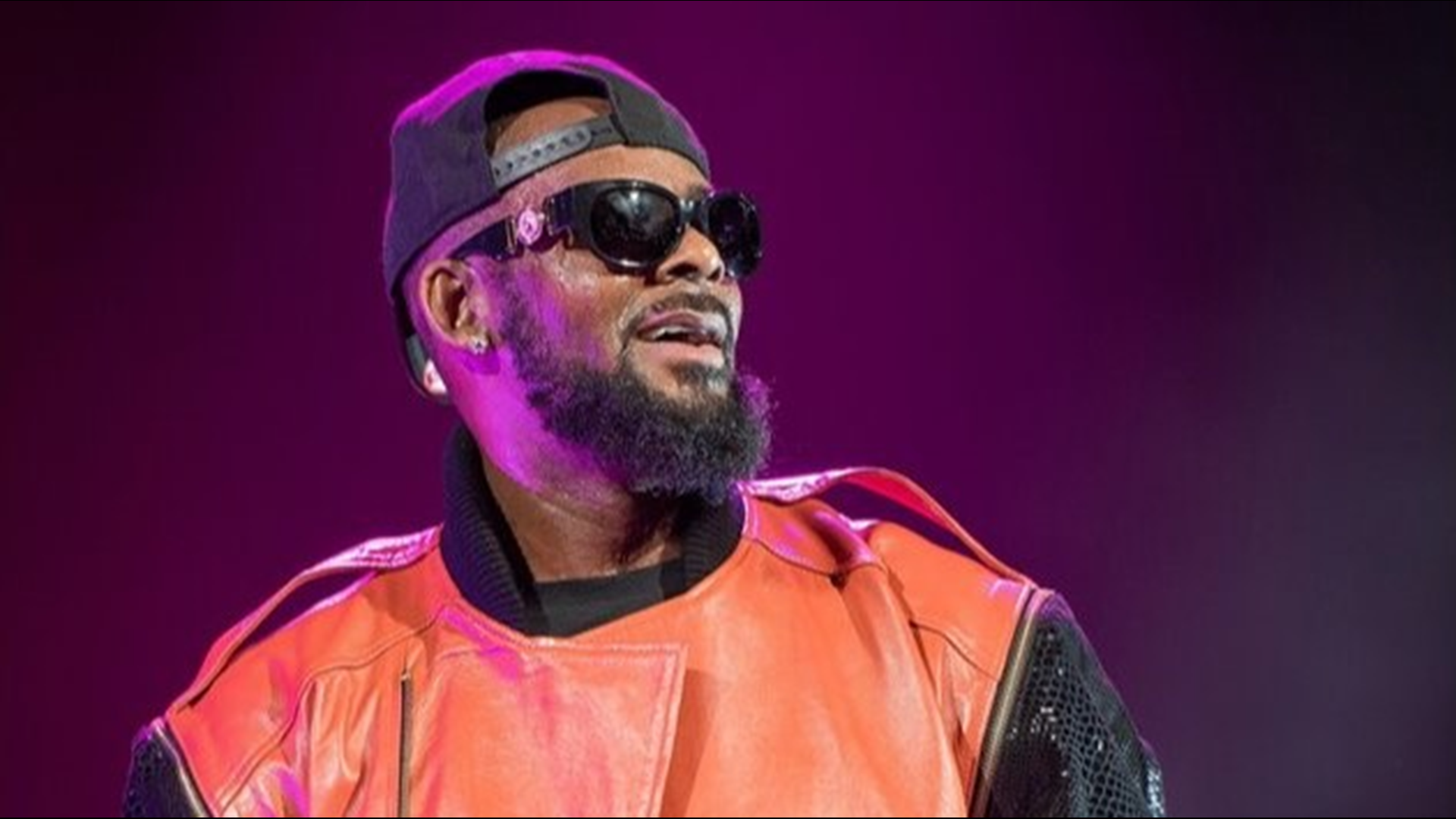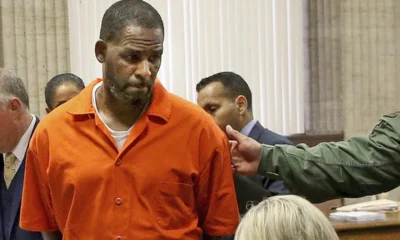CELEBRITY
See who attack R. Kelly: R. Kelly Attacked In Prison

The Troubling Case of R. Kelly: Attacks and Accountability in Prison
The saga of R. Kelly continues to unfold, marked by controversy, legal battles, and now reports of violence within the prison system.
As a figure who has long been at the center of public scrutiny, Kelly’s recent experiences in prison have raised significant questions about the treatment of inmates, the nature of justice, and the broader implications for society.
This article delves into the details surrounding R. Kelly’s situation, examining the circumstances of his imprisonment, the reported attacks, and the reactions from both the public and the media.
Background: The Rise and Fall of R. Kelly
R. Kelly, once celebrated as one of the most successful R&B artists of his generation, has faced a dramatic fall from grace.
His career, which includes numerous hits and accolades, was overshadowed by serious allegations of s*xual misconduct and abuse.
In 2021, Kelly was convicted on multiple charges, including racketeering and violations of the Mann Act, which prohibits the transportation of individuals across state lines for illegal s*xual activity.
The trial brought to light a series of disturbing accusations, revealing a pattern of predatory behavior that spanned decades.
As details emerged, public outrage grew, leading to a reckoning in the music industry regarding accountability for artists accused of serious crimes.
Imprisonment and Initial Reactions
Following his conviction, R. Kelly was sentenced to 30 years in prison.
This sentence was met with mixed reactions from the public.
While many applauded the decision as a necessary step towards justice for the victims, others expressed concern over the implications of such a lengthy sentence.
Critics argued that the punishment could be seen as excessive, particularly in comparison to other high-profile cases where individuals received lighter sentences for similar or more serious offenses.
As Kelly began serving his time, the focus shifted to his life behind bars and the challenges he would face as a high-profile inmate.
Reports of Violence in Prison
Recently, reports surfaced indicating that R. Kelly was attacked in prison.
Details surrounding the incident remain somewhat unclear, but it has been confirmed that he was involved in a violent altercation with other inmates.
Such incidents are not uncommon in prison settings, especially for individuals like Kelly, whose notoriety can make them targets for violence.
Prison experts have noted that high-profile inmates often face unique challenges, including the potential for violence from other inmates who may view them as symbols of their own grievances or frustrations.
The nature of Kelly’s crimes, particularly the s*xual abuse allegations, adds another layer of complexity to his situation.
The Aftermath of the Attack
Following the attack, there has been a significant outpouring of concern and commentary from various quarters.
Supporters of R. Kelly have expressed outrage over the violence he faced, arguing that it highlights the need for better protection for inmates, particularly those who are high-profile figures.
 see
see
They contend that the prison system should take measures to ensure the safety of all inmates, regardless of their past actions.
Conversely, critics argue that Kelly’s past actions have consequences, and that he must face the reality of his situation.
This dichotomy in public opinion underscores the complexities of justice and accountability in cases involving celebrities.
The Role of the Media
The media has played a crucial role in shaping public perception of R. Kelly’s case.
Coverage of his trial and subsequent imprisonment has been extensive, with
and accountability in cases involving celebrities.
The Role of the Media
The media has played a crucial role in shaping public perception of R. Kelly’s case.
Coverage of his trial and subsequent imprisonment has been extensive, with numerous outlets reporting on every development.
This intense scrutiny has led to a polarized view of Kelly, with some seeing him as a victim of circumstance while others view him as a predator deserving of harsh punishment.
The media’s portrayal of the prison attack has further fueled this debate, with headlines often sensationalizing the incident.
This raises important questions about the responsibility of the media in reporting on such cases and the potential impact of their narratives on public perception.
The Implications for Prison Reform
The violence R. Kelly experienced in prison has sparked renewed discussions about the state of the prison system in the United States.
Advocates for prison reform argue that the system is fundamentally flawed, often failing to protect inmates and provide them with the support they need.
Reports of violence, overcrowding, and inadequate mental health services are common, raising concerns about the overall treatment of individuals within the system.
As a figure who has long been at the center of public scrutiny, Kelly’s recent experiences in prison have raised significant questions about the treatment of inmates, the nature of justice, and the broader implications for society.
This article delves into the details surrounding R. Kelly’s situation, examining the circumstances of his imprisonment, the reported attacks, and the reactions from both the public and the media.
Background: The Rise and Fall of R. Kelly
R. Kelly, once celebrated as one of the most successful R&B artists of his generation, has faced a dramatic fall from grace.
His career, which includes numerous hits and accolades, was overshadowed by serious allegations of s*xual misconduct and abuse.
In 2021, Kelly was convicted on multiple charges, including racketeering and violations of the Mann Act, which prohibits the transportation of individuals across state lines for illegal s*xual activity.
The trial brought to light a series of disturbing accusations, revealing a pattern of predatory behavior that spanned decades
As details emerged, public outrage grew, leading to a reckoning in the music industry regarding accountability for artists accused of serious crimes.
thumbnail
Imprisonment and Initial Reactions
Following his conviction, R. Kelly was sentenced to 30 years in prison.
This sentence was met with mixed reactions from the public.
While many applauded the decision as a necessary step towards justice for the victims, others expressed concern over the implications of such a lengthy sentence.
Critics argued that the punishment could be seen as excessive, particularly in comparison to other high-profile cases where individuals received lighter sentences for similar or more serious offenses.
As Kelly began serving his time, the focus shifted to his life behind bars and the challenges he would face as a high-profile inmate.
Reports of Violence in Prison
Recently, reports surfaced indicating that R. Kelly was attacked in prison.
Details surrounding the incident remain somewhat unclear, but it has been confirmed that he was involved in a violent altercation with other inmates.
Such incidents are not uncommon in prison settings, especially for individuals like Kelly, whose notoriety can make them targets for violence.
Prison experts have noted that high-profile inmates often face unique challenges, including the potential for violence from other inmates who may view them as symbols of their own grievances or frustrations.
The nature of Kelly’s crimes, particularly the s*xual abuse allegations, adds another layer of complexity to his situation.
The Aftermath of the Attack
Following the attack, there has been a significant outpouring of concern and commentary from various quarters.
Supporters of R. Kelly have expressed outrage over the violence he faced, arguing that it highlights the need for better protection for inmates, particularly those who are high-profile figures.
They contend that the prison system should take measures to ensure the safety of all inmates, regardless of their past actions.
Conversely, critics argue that Kelly’s past actions have consequences, and that he must face the reality of his situation.
This dichotomy in public opinion underscores the complexities of justice
and accountability in cases involving celebrities.
The Role of the Media
The media has played a crucial role in shaping public perception of R. Kelly’s case.
Coverage of his trial and subsequent imprisonment has been extensive, with numerous outlets reporting on every development.
This intense scrutiny has led to a polarized view of Kelly, with some seeing him as a victim of circumstance while others view him as a predator deserving of harsh punishment.
The media’s portrayal of the prison attack has further fueled this debate, with headlines often sensationalizing the incident.
This raises important questions about the responsibility of the media in reporting on such cases and the potential impact of their narratives on public perception.
R. Kelly avoids lengthy add-on to 30-year prison sentence
The Implications for Prison Reform
The violence R. Kelly experienced in prison has sparked renewed discussions about the state of the prison system in the United States.
Advocates for prison reform argue that the system is fundamentally flawed, often failing to protect inmates and
provide them with the support they need.
Reports of violence, overcrowding, and inadequate mental health services are common, raising concerns about the overall treatment of individuals within the system.
The situation surrounding Kelly serves as a reminder of the urgent need for reform, particularly for vulnerable populations within prisons.
Public Reactions to the Attack
In the aftermath of the attack, social media has become a battleground for opinions on R. Kelly’s situation.
Many users have taken to platforms like Twitter and Instagram to express their views, often in highly emotional terms.
Supporters argue that Kelly deserves Public Reactions to the Attack
In the aftermath of the attack, social media has become a battleground for opinions on R. Kelly’s situation.
Many users have taken to platforms like Twitter and Instagram to express their views, often in highly emotional terms.
Supporters argue that Kelly deserves compassion and protection, while detractors maintain that he should face the consequences of his actions, regardless of the circumstances.
This discourse reflects broader societal attitudes towards accountability, justice, and the complexities of human behavior

















